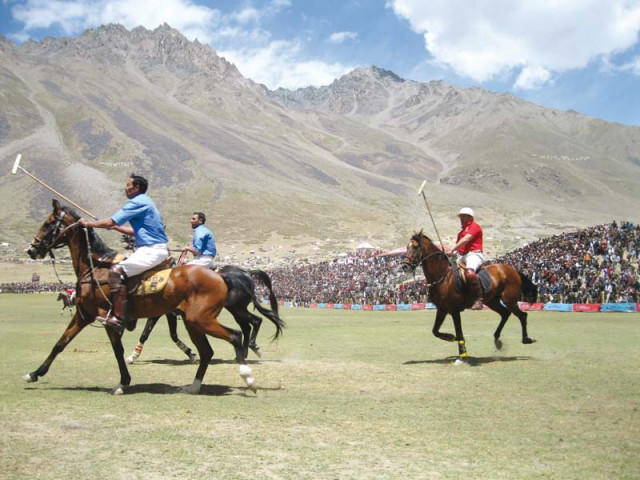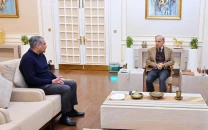On high horses: Shandur continues a proud polo tradition
Sport is being played in Chitral since 1320 BC, claims historian

Played against a backdrop of fields and mountains, the Shandur Polo Festival offers more than just a polo competition to the spectators. PHOTO COURTESY: ABDUR RAZZAQ
According to the Chitral district administration, over 100,000 visitors camped in more than 1,600 tents to witness the spectacle. But the tournament almost didn’t take place, with a dispute over the Shandur polo ground threatening to complicate things.
In the end though, the passion for the sport prevailed and thousands breathed a sigh of relief.
Military-facilitated training helps Pakistani shooters reach Rio Olympics
Chitral captain Shazada Sikandarul Mulk has been playing polo since the tender age of 10 and the Shandur polo ground, where he has been coming for the past 34 years, is home away from home for the member of the Chitrali royal family.
Mulk reveals the sport’s moniker is not without cause, with the cost of owning and maintaining a horse meaning only those with wide purses can afford to dabble in the sport.
“For polo, horses are purchased young,” he said. “A horse’s polo training can begin as early as two and it takes between Rs15,000 and Rs20,000 per month to feed a horse and keep it in good condition.”
Polo players were provided financial support by the state back when Chitral was a princely state but that stopped once it merged with Pakistan in 1969. Since then, the players have been forced to fend for themselves.
Shah’s father unhappy about flag bearer decision
“This is my seventh tournament,” said Mulk. “We play freestyle polo in Chitral, which is the real form of the sport.”

And the sport is played with slight tweaks across the globe. “In Switzerland we play polo on ice during winter but in Pakistan it is played in summer season,” said a Swiss visitor Hira. “There we have to change horses every eight minutes because they get tired and fall easily on the ice. In Chitral, a round lasts 25 minutes and no horses are changed during that time.”
Gilgit, once comprising of nine princely states, boasts a rich polo tradition in its villages. At the beginning of spring, polo and dance competitions are held across the province, with the first polo event called the ‘Jashane Baharan (spring celebration)’.
“Most of the players in Gilgit sold their lands and fields to purchase and maintain horses,” said a local journalist Manzar Shigri. “It is impossible for the common man to bear such expenses without the help of the government.”
With such a rich polo history behind them, passion for the sport understandably runs high among the people. “Though the Shandur Pass is quite far from the villages, the children are quite excited about the tournament,” said jeep driver Usman Khan. “If Chitral wins the tournament, the children shout slogans in their honour but if they are defeated then the children throw dirt on their horses and on them.”
A proud history
Columnist and historian Dr Inayatullah Faizi revealed polo is being played in Chitral for over 3,000 years. “Players from Badakhshan — currently a province of Afghanistan — Turkestan and Kashgar participated in tournaments of polo and horse riding held in Chitral as far back as 1320 BC,” he said. “Before Partition, horses were brought for polo from Kohestan and Badakhshan as they were powerful and could play on high altitudes.”
Faizi revealed that several prominent historical figures, including Qutubuddin Aibak, were fond of polo and other games played on horseback.
The sport’s popularity may pale in comparison to that of other sports such as cricket and football, but polo can more than hold its own when it comes to tradition. Game of kings indeed.
Published in The Express Tribune, August 6th, 2016.
Like Sports on Facebook, follow @ETribuneSports on Twitter to stay informed and join in the conversation.


















COMMENTS
Comments are moderated and generally will be posted if they are on-topic and not abusive.
For more information, please see our Comments FAQ